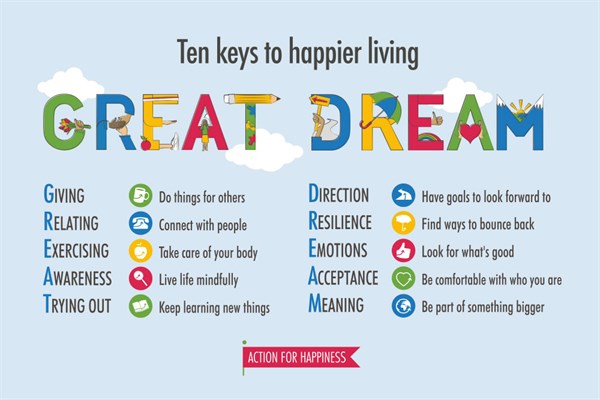Writing for Happiness
04 Dec 2017 | Sue T

"At any one time a million people are in the process of
writing a book. Less than one percent of them will ever get
published" ~ Tony Cook
I love writing. But as the quote above shows, when it comes to
the major goal of getting published, 99% of us will end up
disappointed.
So we'll end up being losers in the race of... hang on, who said
writing was a race? I love writing - doing it brings me joy. As
this article demonstrates, writing has the potential to connect us
with all of the Ten
Keys to Happier Living. Perhaps this is why I love it so
much!

GIVING: Do things for others
Writing is a powerful way to share the gift of language for
mutual good. We can give our readers stories, poems and essays that
offer solutions to problems.
We can remind them of the beauty of this world, we can spark
their curiosity, make them laugh, help them explore the unfamiliar,
disempower their demons and introduce them to characters who can
become their friends and teachers.
RELATING: Connect with people
Writing is often seen as a solitary activity, but it's all about
connection.
It's a bridge between our own experience and the minds of other
people. We share our inventions and discoveries by putting them on
the page for others to read. And we can write with others, share
our work with others, and talk about writing with others.
There are local and online writing groups: if you can't find
one, start one. I particularly like NaNoWriMo (National Novel Writing Month) - an
annual challenge to write 50 000 words in November.
We can connect directly with others via writing letters (or
their email equivalent). We can write to a prisoner, a housebound
person, a friend or relation. We can blog.

EXERCISING: Take care of your body
Our best inspiration for writing often comes when we're re
spending time outside - ideally in sunshine and natural
surroundings - perhaps walking, running or gardening.
Although we usually write sitting down - and sometimes forget
the body completely while writing - we can take care of ourselves
by taking regular screen breaks, using a "kneeler" chair, standing
or treadmill desk. We can also remember to stretch, to stop when
tired and to keep good eating and sleeping habits.
AWARENESS: Live life mindfully
Writing is all about paying attention. What we perceive is what
we get to write about. Where we send our attention, there we will
go. As Carol Severance says, "The most important thing a writer can
do is write from the heart".
We can be kind to other writers by taking their writing
seriously, by giving attention to their work, and by offering
honest and constructive feedback on request. And we can be kind to
ourselves as writers. We can take our own work seriously, offering
our ideas to other people.
We can show up at the page. We can be kind to ourselves when
we're dumbstruck, or tired, or angry, or sad, or too busy or ill or
distracted to sit down and write. We can offer ourselves the same
support we would give to another writer.
TRYING OUT: Keep learning new things
Every story is a learning experience. As our characters learn
things, we do too.
We write to find out what's going on, because we're curious,
because we want to understand. There is always something new to
try.
Most first drafts aren't perfect. That's fine. Miles Davis said
"Do not fear mistakes. There are none".
Everything we try that doesn't work is an experiment we can
learn from, a prompt to try something else, do something
different
DIRECTION: Have goals to look forward to
The "outcome goal" of professional publication is often seen as
a writer's only valid goal. However, focusing only on publication
can lead us to see writing as a competitive activity, success as
available only to a few, and money as the only valid reward for
talent, persistence, and luck.
Writing's process goals - the joys of actually writing - are
available to everyone who writes: the joy of a new idea or image,
the joy of saying something clearly, the music of a well-turned
phrase.
Looking at the process of writing, the first goal, hardest for
many, is STARTING. We have to just do it, just commit, just go,
jump off into the empty page.
The next goal is CONTINUING. Writing is like a river; it bubbles
mysteriously out of the mind's deep places, then takes off
downhill, suddenly changing direction, speeding up, slowing down,
sometimes disappearing completely. We have to go with the flow.
The final goal is STOPPING. We may stop before we get to where
we thought we were going, or continue way past that point. Endings
are hard; real life has no "closure" - time keeps passing and
events keep happening. We may need to practice letting go.
RESILIENCE: Find ways to bounce back
Writing is a great way to build resilience.
Many stories ask, "What if..?" We can run thought experiments on
paper, writing our characters out of trouble. These thought
patterns can become good habits that help to preserve our wellbeing
in times of stress and depletion, and in the face of setbacks.
We can learn to care for ourselves when our writing goals are
thwarted: this can happen with either outcome goals ("My story has
been rejected"), or process goals ("I am stuck").
Resilience doesn't mean pretending that everything is OK; it
means accepting that there are times when everything's not OK - and
working out how to go on from there.
And we can write about the negative stuff - anger, fear, pain,
death - with honesty and clarity, in a way that helps others with
these universal challenges.

EMOTIONS: Look for what's good
Looking for the positive supports our wellbeing. This means
being open to noticing good things even in the presence of bad
things.
Negative thoughts tend to DEMAND our attention; we see them as
threats - which are particularly difficult to deal with when they
are not there. As darkness is an absence of light, and cold is an
absence of heat, so misery is an absence of joy, and to get more
joy, we need to be looking at the joy, paying attention to it,
welcoming it, giving it room in our minds.
For writers, then, it's all about the notebook. We can make a
note of small beauties, kind actions, things we are grateful for,
and remember to incorporate these in our writing.
ACCEPTANCE: Be comfortable with who you are
Most of us are tougher on ourselves than we are on others.
Acceptance means "to consent to take (something offered)": we can
offer ourselves the same kind of support that we would offer a
fellow writer.
Empathy is an important skill for writers: increasing our
understanding of character, personality and motivation will benefit
our writing. Accepting other people as they are also helps us avoid
judgemental comparisons.
HOWEVER, there is a voice to ignore - the voice of the inner
critic, the demon on your shoulder who says "You're no good. You're
a failure. You are boring, and you can't spell." Put this one in an
old jam-jar and screw down the lid; turn the volume all the way
down.
One way to silence the demon, advocated by several writing
teachers, is "thought dumping" - writing AS FAST AS YOU CAN without
bothering about spelling, grammar, complete sentences, or niceties
of that kind.
This crashes through all the barriers erected by the Department
of Internal Criticism and Censorship, because you're writing so
bloody fast that you can't stop to think what you're saying.
Dumping thoughts on the page without attaching to them is a great
way to watch them come and go.
MEANING: Be part of something bigger
We are happier when we feel our lives have meaning. Writing is
all about meaning; it's a way to give our experience, real and
imagined, pattern and shape.
We can write about what we value, and share that with others. We
can find out what we really mean by writing it down. We can control
the worlds we build through words. We can write to benefit
ourselves and others.

And finally...
"Everything is held together with stories. That is all that is
holding us together, stories and compassion" ~ Barry Lopez
When you speak with someone or write about events that have
taken place in your life, you are creating a narrative that helps
you understand how you became you. We don't always realise that
we're the authors of our stories and can change the way we're
telling them.
Here are some other good books to support you on your journey as a
writer: